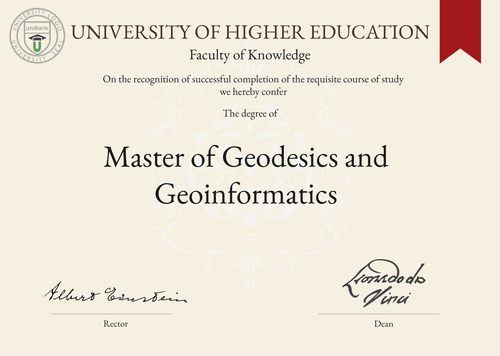
Master of Geodesics and Geoinformatics (MGG)
Guide to Master of Geodesics and Geoinformatics Program/Course/Degree
Master of Geodesics and Geoinformatics (MGG)

Program Name
Master of Geodesics and GeoinformaticsProgram or Degree abbreviation
MGGDuration range
The duration of the program typically ranges from 1 to 2 years.Tuition range
The tuition fees for the program vary depending on the country and university, ranging from $5,000 to $30,000 per year.Overview
The Master of Geodesics and Geoinformatics program is designed to provide students with advanced knowledge and skills in the field of geodesy and geoinformatics. It focuses on the study of Earth's shape, gravity field and spatial data analysis. Students will learn to use advanced technologies and software tools for data collection, analysis and visualization.Curriculum Overview by year
- Year 1: Introduction to Geodesy, Geoinformatics and Spatial Data Analysis; Geodetic Measurements and Data Processing; Geospatial Data Management; Geodetic Reference Systems and Coordinate Transformations. - Year 2: Advanced Geodesy and Geoinformatics; Geospatial Data Analysis and Modeling; Geodetic Network Design and Adjustment; Remote Sensing and Image Analysis.Key Components
- Geodesy: Study of Earth's shape, gravity field and geodetic measurements. - Geoinformatics: Use of advanced technologies and software tools for spatial data analysis and visualization. - Spatial Data Analysis: Techniques for analyzing and interpreting geospatial data. - Remote Sensing: Use of satellite imagery and aerial photographs for mapping and monitoring Earth's surface.Career Prospects
Graduates of the Master of Geodesics and Geoinformatics program can pursue various career paths, including: - Geospatial Analyst - GIS Specialist - Surveyor - Remote Sensing Specialist - Geospatial Data ManagerSalary Expectations
The salary expectations for graduates of the program vary depending on factors such as location, experience and job position. On average, geospatial analysts earn around $60,000 to $80,000 per year. For a more accurate understanding of salary expectations, you can utilize the Job Sites Search Engine, from our sister site jobRank, which searches over 4,600 job sites worldwide. Make sure to specify not only the job title but also the country you are interested in.Conclusions:
It is important to note that the duration, tuition fees, curriculum, key components, career prospects and salary expectations of the Master of Geodesics and Geoinformatics program can vary: - By the chosen country or location where to study the program. - By the chosen university where to study the program. Visitors interested in pursuing this specific degree can search for universities offering the Master of Geodesics and Geoinformatics program worldwide through the uniRank World Universities Search Engine.World Universities Search Engine
search for Master of Geodesics and Geoinformatics (MGG) and add the Location (country, state etc.) or specific University you are interested in studying at.
Query examples:
- Master of Geodesics and Geoinformatics (MGG) United States
- Master of Geodesics and Geoinformatics (MGG) United Kingdom online
- Master of Geodesics and Geoinformatics (MGG) Australia international students
- Master of Geodesics and Geoinformatics (MGG) University of California
- Master of Geodesics and Geoinformatics (MGG) University of London tuition fees
- Master of Geodesics and Geoinformatics (MGG) University of Sydney scholarships
Share Program/Course
Interesting? Share this program/course/degree info with your friends now.